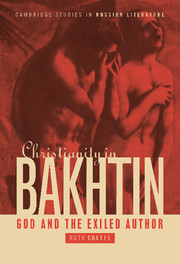Book contents
- Frontmatter
- Contents
- Acknowledgements
- List of abbreviations
- Note on translation and citation
- Chapter 1 Introduction
- Chapter 2 Fall and Incarnation in ‘Towards a Philosophy of the Act’
- Chapter 3 The aesthetic gospel of ‘Author and Hero in Aesthetic Activity’
- Chapter 4 Was Bakhtin a Marxist?: The work of the Bakhtin Circle, 1924–1929
- Chapter 5 Falling silent: the critical aesthetic of Problems of Dostoevsky's Creative Work
- Chapter 6 The exiled author: ‘Discourse in the Novel’ and beyond
- Chapter 7 Christian motifs in Bakhtin's carnival writings
- Chapter 8 The fate of Christian motifs in Bakhtin's work
- Notes
- Bibliography
- Index
- CAMBRIDGE STUDIES IN RUSSIAN LITERATURE
Chapter 2 - Fall and Incarnation in ‘Towards a Philosophy of the Act’
Published online by Cambridge University Press: 22 September 2009
- Frontmatter
- Contents
- Acknowledgements
- List of abbreviations
- Note on translation and citation
- Chapter 1 Introduction
- Chapter 2 Fall and Incarnation in ‘Towards a Philosophy of the Act’
- Chapter 3 The aesthetic gospel of ‘Author and Hero in Aesthetic Activity’
- Chapter 4 Was Bakhtin a Marxist?: The work of the Bakhtin Circle, 1924–1929
- Chapter 5 Falling silent: the critical aesthetic of Problems of Dostoevsky's Creative Work
- Chapter 6 The exiled author: ‘Discourse in the Novel’ and beyond
- Chapter 7 Christian motifs in Bakhtin's carnival writings
- Chapter 8 The fate of Christian motifs in Bakhtin's work
- Notes
- Bibliography
- Index
- CAMBRIDGE STUDIES IN RUSSIAN LITERATURE
Summary
The world of semantic content is endless and suffices to itself, its in-itself significance renders me unnecessary, my act is arbitrary for it. This is the sphere of endless questions, where even the question, ‘who is my neighbour?’, is possible.
(‘Philosophy of the Act’, 114)Bakhtin's earliest surviving texts date back to the first half of the 1920s. They comprise a very short essay entitled ‘Art and Responsibility’ (1919), and two much longer, although incomplete, philosophical essays known as ‘Author and Hero in Aesthetic Activity’ and ‘Towards a Philosophy of the Act’. ‘Author and Hero’ is a treatise on aesthetics; it forms the subject of the next chapter. ‘Philosophy of the Act’ was almost certainly written before ‘Author and Hero’, but even if it was not it belongs before it on thematic grounds. We know this because in ‘Philosophy of the Act’ (122) Bakhtin himself provides an outline of a large philosophical project (which he never completed) in four parts, of which ‘Philosophy of the Act’ is the first. The second part was to be on aesthetics, so it is reasonable to assume that ‘Author and Hero’ fits in at this point, and the third and fourth parts were to be devoted to the ethics of politics and the ethics of religion respectively. These last two parts, if they were ever begun, have unfortunately not survived.
All of these works were produced during Bakhtin's years in Nevel′ and Vitebsk immediately following his graduation from Petrograd University in 1918.
- Type
- Chapter
- Information
- Christianity in BakhtinGod and the Exiled Author, pp. 25 - 36Publisher: Cambridge University PressPrint publication year: 1999



